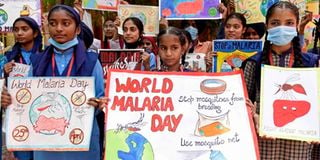Political will, new tools and increased funding necessary to win malaria war

Students hold placards during an event to mark the World Malaria Day at a government hospital on the outskirts of Amritsar on April 25, 2022.
For many years, malaria was the deadliest disease across the continent. At the turn of the millennium, African governments and external partners joined hands with communities and drove malaria into retreat. These efforts saved millions of lives and revitalised economies.
In many countries across Africa, the disease is once again on the rise. The progress began to slow around 2015. In the last few years, we have been on the back foot, falling behind in our goal to end the disease by 2030.
Today, malaria is resurging. A child dies of the disease every minute. Globally, there were an estimated 241 million malaria cases and 627,000 malaria deaths in 2020. This represents about 14 million more cases in 2020 compared to 2019 and 69,000 more deaths. African countries account for 96 percent of global malaria cases and 98 percent of global malaria deaths. In 2020, over 600,000 Africans lost their lives — most of them were children less than five years of age.
Malaria deaths
The emergence of the Covid-19 pandemic has threatened the gains made in the fight against malaria. Without the rapid and determined actions that countries together with partners and communities took to mitigate the disruption of Covid-19 on malaria programmes, there would have been an even more people dying. These actions averted the worst-case scenario of a potential doubling of malaria deaths that had been initially projected by WHO (World Health Organization) in early 2020.
We have what it takes to not only stop this downturn but also accelerate progress in the fight against malaria. We must ensure that everyone, everywhere can access tools to prevent malaria such as mosquito nets, indoor residual spraying and seasonal malaria chemoprevention. We must also ensure that, when people get sick, they can access treatment as soon as they need it.
New malaria vaccine
But what got us here will not get us where we need to be in 2030. We must renew the urgency to provide wider access to the new tools that can help us accelerate progress against this disease.
One of these tools is the new malaria vaccine, RTS,S. Since 2019, more than one million children have been reached with at least one dose of this vaccine through pilot introductions in Ghana, Kenya and Malawi. Now, we must invest in making the vaccine widely accessible and more affordable.
Another tool that needs our attention is the new-generation mosquito nets treated with dual insecticides. The effectiveness of older nets is partly compromised by emerging resistance to the insecticides. But we now have a new class of mosquito nets[1] that can make a big difference in preventing this disease. We must invest in producing these new tools and making them quickly available to the most vulnerable communities. Above all, to tip the scales against this disease, we must commit more resources to this fight.
The choice is clear: We can step up investments in the fight against malaria now, or we can delay and end up paying much more later.
All countries where malaria is endemic — most of them in Africa — must commit more of their own money to this fight. It is not just a moral imperative, but also the smart thing to do — it is estimated that every dollar invested in ending malaria yields $36 in economic returns.
Beyond domestic investments in malaria, we must galvanise more international financing. As Covid-19 has demonstrated, fighting a pathogen in one corner of the world is not an act of charity, but a choice to make everyone, in every part of the world, safer.
International funding
One such opportunity to step up international funding in the fight against malaria comes this year when world leaders gather in the United States for the Global Fund’s seventh replenishment conference.
The Global Fund to Fight Aids, Tuberculosis and Malaria provides 56 percent of international financing for malaria. Across Africa, we have seen the fruits of our partnership with the Global Fund, which has saved millions of lives and revitalised numerous communities.
The impact of that partnership came to count immensely as we responded to Covid-19, using the same systems built in the fight against other infectious diseases. Investing more in the Global Fund is one of the best gifts the world can give itself.
It is an opportunity to fight for healthy communities, and for a more equitable world free from fear of today’s infectious diseases such as malaria as well as future pandemics.
In the African spirit of Ubuntu that calls on us to revitalise our bond to serve the whole of humanity, caring for everyone, everywhere — leaving no one behind — let us fight for what truly counts by investing more in the fight against malaria.
President Kenyatta is the chair of the African Leaders Malaria Alliance





